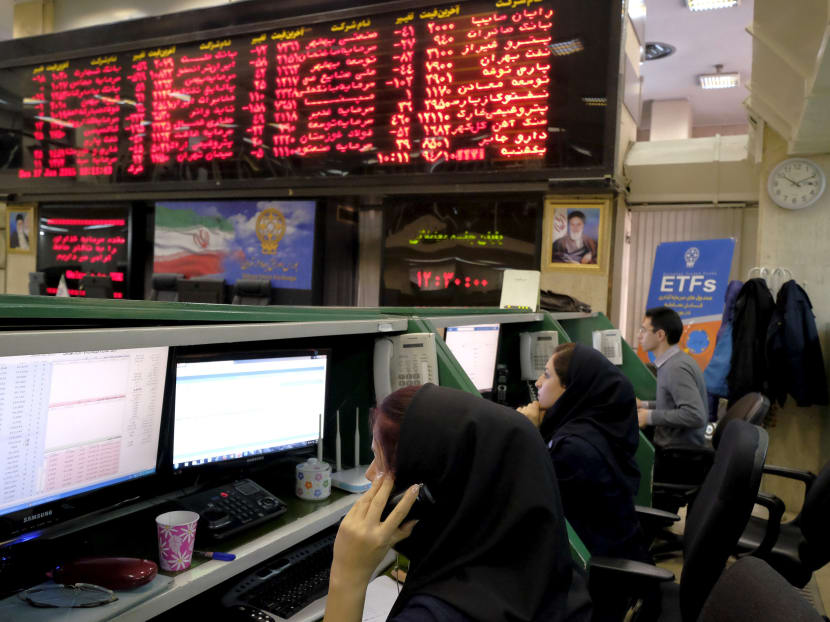Stock slump worsens in Asia as Iran sinks crude while yuan gains
WELLINGTON — Markets started the week gripped by a fresh bout of risk aversion, as Asian stocks slipped with energy-linked currencies amid further hemorrhaging in crude oil prices. Demand for haven assets supported government debt and gold.

Stock market employees work at Tehran's Stock Exchange in Tehran, Iran, Jan 17, 2015. Photo: Reuters
WELLINGTON — Markets started the week gripped by a fresh bout of risk aversion, as Asian stocks slipped with energy-linked currencies amid further hemorrhaging in crude oil prices. Demand for haven assets supported government debt and gold.
Japan’s Nikkei 225 Stock Average was on the cusp of a bear market as Chinese shares fluctuated. Sovereign bonds in the region climbed, and the cost of protecting against corporate defaults in Australia rose to a three-year high. Brent crude dipped below US$28 (S$40.3) a barrel, with Nomura Holdings predicting a potential drop to US$25 today (Jan 18) as Iran pledged to immediately boost exports following the lifting of sanctions. The yuan jumped in Hong Kong as the People’s Bank of China boosted the currency’s reference rate by the most since Dec 21, fueling a rebound in Australia’s dollar. Malaysia’s ringgit retreated.
“Worries about China, the Fed and global growth are likely to drive continued share market weakness and volatility in the short term,” Mr Shane Oliver, head of investment strategy in Sydney at AMP Capital Investors, which oversees about US$115 billion, said by e-mail. “Expect volatility to remain high.”
Iran said it’s targeting an increase in shipments of 500,000 barrels a day amid the removal of sanctions capping crude sales, a move that would likely worsen a global glut that has spurred a 38 percent slide in oil over the past year. The slump in energy prices is fueling concern over disinflation, just as the US embarks on tighter monetary policy and as anxiety over China’s management of its slowing economy rattles markets. Figures today indicated improvement in China’s property sector, ahead of a swathe of data tomorrow that will include an update on fourth-quarter gross domestic product.
STOCKS
The MSCI Asia Pacific Index sank 1.2 per cent as of 10.43am Tokyo time, sliding toward its lowest close since September 2012. The Nikkei 225 was down 1.4 per cent, bringing its slump from a peak reached in June to 19 per cent. The Shanghai Composite Index swung between gains and losses in the first 30 minutes of trading, while shares in Hong Kong retreated.
In Singapore, trading opened with the Straits Times Index down 1.5 per cent, thanks to data released before market opening showing non-oil domestic exports shrank by a worse-than-expected 7.2 per cent in December from a year ago, the second straight month of contraction, after shipments to China fell more sharply. The STI was trading at 2,587.23, down 1.65 per cent, at 10.25am.
Australia’s S&P/ASX 200 Index lost 0.7 per cent, paring an initial slide of as much as 1.8 per cent. The bank and resource stock-heavy gauge is down 19 per cent from an April high, with BHP Billiton, the world’s biggest mining company, sliding 3 per cent. The Kospi index in South Korea fell 0.1 per cent, while New Zealand’s S&P/NZX 50 Index dropped 1.5 per cent to its lowest level since Dec 15. The news on Iran saw Saudi Arabian equities slide more than 7 per cent during yesterday's trading.
Futures on the Standard & Poor’s 500 Index rose 0.1 per cent, swinging to gains after slipping as much as 0.8 per cent earlier in the session. The US benchmark sank 2.2 per cent on Friday, led by technology shares and energy producers to its lowest level since August. US stocks are also off to their worst start to a year on record, with a gauge of volatility expectations soaring on Friday. Markets in the US are closed today for a public holiday.
Japan reports on industrial output today with central bank chief Haruhiko Kuroda telling a group of bank managers in Tokyo tpday that policy makers will monitor risks and make adjustments should they be needed. Along with the GDP update, China also reports on factory output and retail sales tomorrow. BLOOMBERG





